Yogurt vs. Cheese — In-Depth Nutrition Comparison
Compare
A recap on the differences between yogurt and cheese
- Cheese is higher than yogurt in calcium, phosphorus, selenium, zinc, vitamin A, vitamin B12, and vitamin B2.
- Cheese covers your daily saturated fat needs 94% more than yogurt.
- The amount of sodium in yogurt is lower.
- The glycemic index of cheese is lower.
Food varieties used in this article are Yogurt, Greek, plain, nonfat and Cheese, cheddar.
Infographic

Infographic link
Mineral Comparison
Mineral comparison score is based on the number of minerals by which one or the other food is richer. The "coverage" charts below show how much of the daily needs can be covered by 300 grams of the food.
| Contains more PotassiumPotassium | +85.5% |
| Contains less SodiumSodium | -94.5% |
| Contains more MagnesiumMagnesium | +145.5% |
| Contains more CalciumCalcium | +545.5% |
| Contains more IronIron | +100% |
| Contains more CopperCopper | +76.5% |
| Contains more ZincZinc | +600% |
| Contains more PhosphorusPhosphorus | +237% |
| Contains more ManganeseManganese | +200% |
| Contains more SeleniumSelenium | +193.8% |
Vitamin Comparison
Vitamin comparison score is based on the number of vitamins by which one or the other food is richer. The "coverage" charts below show how much of the daily needs can be covered by 300 grams of the food.
| Contains more Vitamin B3Vitamin B3 | +252.5% |
| Contains more Vitamin AVitamin A | +32900% |
| Contains more Vitamin EVitamin E | +7000% |
| Contains more Vitamin DVitamin D | +∞% |
| Contains more Vitamin B1Vitamin B1 | +26.1% |
| Contains more Vitamin B2Vitamin B2 | +54% |
| Contains more Vitamin B5Vitamin B5 | +23.9% |
| Contains more Vitamin B12Vitamin B12 | +46.7% |
| Contains more Vitamin KVitamin K | +∞% |
| Contains more FolateFolate | +285.7% |
All nutrients comparison - raw data values
| Nutrient |  |
 |
DV% diff. |
| Saturated fat | 0.117g | 18.867g | 85% |
| Calcium | 110mg | 710mg | 60% |
| Fats | 0.39g | 33.31g | 51% |
| Phosphorus | 135mg | 455mg | 46% |
| Vitamin A | 1µg | 330µg | 37% |
| Selenium | 9.7µg | 28.5µg | 34% |
| Cholesterol | 5mg | 99mg | 31% |
| Zinc | 0.52mg | 3.64mg | 28% |
| Sodium | 36mg | 653mg | 27% |
| Protein | 10.19g | 22.87g | 25% |
| Monounsaturated fat | 0.053g | 9.246g | 23% |
| Calories | 59kcal | 404kcal | 17% |
| Vitamin B12 | 0.75µg | 1.1µg | 15% |
| Vitamin B2 | 0.278mg | 0.428mg | 12% |
| Polyunsaturated fat | 0.012g | 1.421g | 9% |
| Vitamin E | 0.01mg | 0.71mg | 5% |
| Folate | 7µg | 27µg | 5% |
| Magnesium | 11mg | 27mg | 4% |
| Vitamin D | 0 IU | 24 IU | 3% |
| Vitamin D | 0µg | 0.6µg | 3% |
| Potassium | 141mg | 76mg | 2% |
| Vitamin B5 | 0.331mg | 0.41mg | 2% |
| Vitamin K | 0µg | 2.4µg | 2% |
| Iron | 0.07mg | 0.14mg | 1% |
| Copper | 0.017mg | 0.03mg | 1% |
| Manganese | 0.009mg | 0.027mg | 1% |
| Vitamin B1 | 0.023mg | 0.029mg | 1% |
| Vitamin B3 | 0.208mg | 0.059mg | 1% |
| Net carbs | 3.6g | 3.09g | N/A |
| Carbs | 3.6g | 3.09g | 0% |
| Sugar | 3.24g | 0.48g | N/A |
| Vitamin B6 | 0.063mg | 0.066mg | 0% |
| Trans fat | 0.006g | 0.917g | N/A |
| Choline | 15.1mg | 16.5mg | 0% |
| Tryptophan | 0.547mg | 0% | |
| Threonine | 1.044mg | 0% | |
| Isoleucine | 1.206mg | 0% | |
| Leucine | 1.939mg | 0% | |
| Lysine | 1.025mg | 0% | |
| Methionine | 0.547mg | 0% | |
| Phenylalanine | 1.074mg | 0% | |
| Valine | 1.404mg | 0% | |
| Histidine | 0.547mg | 0% | |
| Omega-3 - EPA | 0g | 0.01g | N/A |
| Omega-3 - DHA | 0g | 0.001g | N/A |
| Omega-3 - ALA | 0.001g | N/A | |
| Omega-3 - DPA | 0g | 0.017g | N/A |
| Omega-6 - Eicosadienoic acid | 0g | 0.007g | N/A |
| Omega-6 - Linoleic acid | 0.01g | N/A |
Macronutrient Comparison
Macronutrient breakdown side-by-side comparison
| Contains more CarbsCarbs | +16.5% |
| Contains more WaterWater | +129.9% |
| Contains more ProteinProtein | +124.4% |
| Contains more FatsFats | +8441% |
| Contains more OtherOther | +415.3% |
Fat Type Comparison
Fat type breakdown side-by-side comparison
| Contains less Sat. FatSaturated fat | -99.4% |
| Contains more Mono. FatMonounsaturated fat | +17345.3% |
| Contains more Poly. FatPolyunsaturated fat | +11741.7% |
Carbohydrate type comparison
Carbohydrate type breakdown side-by-side comparison
| Contains more LactoseLactose | +2016.7% |
| Contains more GalactoseGalactose | +600% |
| Contains more GlucoseGlucose | +∞% |
~equal in
Starch
~0g
~equal in
Sucrose
~0g
~equal in
Fructose
~0g
~equal in
Maltose
~0g





